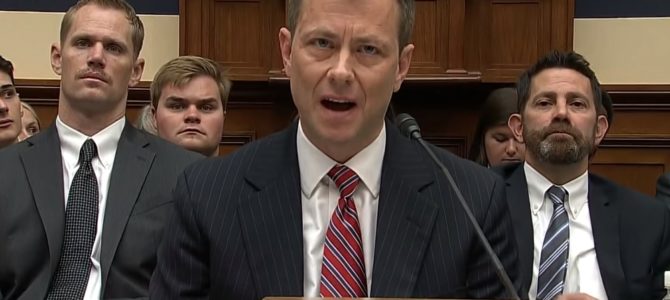
Yesterday Rep. Doug Collins, the ranking Republican on the House Judiciary Committee, released the transcript of the committee’s June 2018 interview of former FBI agent Peter Strzok. Unfortunately, because of the ongoing special counsel investigation, the attorney representing the FBI’s interests directed Strzok to keep mum on the most significant questions. Other important queries went unanswered because Strzok claimed they touched on classified information that could not be disclosed in the unclassified setting.
Nonetheless, Strzok’s testimony, when considered in conjunction with the recently released transcript of the House’s questioning of DOJ attorney Bruce Ohr, provides additional texture helpful for understanding the FBI’s launch of Crossfire Hurricane on July 31, 2016. Together the testimony of the duo further calls into question Democrats’ claim that the salacious Steele dossier played no role in the FBI’s decision to target the Donald Trump presidential campaign, but that instead the FBI “initiated its counterintelligence investigation” based on Trump campaign advisor George Papadopoulos’ purported foreknowledge of the WikiLeaks hack of the Democratic National Committee’s emails.
House Permanent Select Committee on Intelligence (HPSCI) ranking member Rep. Adam Schiff, a Democrat, made this assertion in his minority response to Republican Devin Nunes’ memorandum on Foreign Intelligence Surveillance Act abuse. In his memo, Schiff unequivocally stated “Christopher Steele’s raw intelligence reporting did not inform the FBI’s decision to initiate its counterintelligence investigation in late July 2016.”
Schiff reiterated this claim later, claiming Steele’s reporting “played no role in launching the FBI’s counterintelligence investigation into Russian interference and links to the Trump campaign. In fact, Steele’s reporting did not reach the counterintelligence team investigating Russia at FBI headquarters until mid-September 2016, more than seven weeks after the FBI opened its investigation, because the probe’s existence was so closely held within the FBI. By then, the FBI had already opened sub-inquiries into [several] individuals linked to the Trump campaign,” including former campaign foreign policy advisor Carter Page.
The just-released transcript of Strzok’s testimony and Ohr’s transcript from last week cast Schiff’s comments in a new light. In his memo, the now-chair of HPSCI claimed that Steele’s reporting did not reach the agents investigating Russia “at FBI headquarters” until mid-September 2016. But, as Strzok explained in his testimony, it is unusual for cases to be “opened and run from headquarters.” Rather, “in the normal course of business,” Strzok noted, investigations are run out of FBI field offices.
Strzok’s explanation gives significance to an exchange that occurred during Ohr’s HPSCI testimony. In discussing Steele and the identity of Steele’s “FBI handler,” Ohr testified that he did not “know who was officially his handler,” but suggested that “one of the people he was talking with who may have been his handler was Special Agent Mike Gaeta.”
In response, a committee member “noted that he was under the impression that one of the handlers for Steele was a New York assigned agent. Ohr responded that Gaeta was from the New York office, even though Gaeta worked as an attache out of Rome.” Ohr added that Steele had provided two of his reports to Gaeta.
Ohr’s testimony confirms press reports that Steele flew to Rome to meet with an FBI contact and later, with approval of the assistant secretary of state Victoria Nuland, “on July 5, 2016, Gaeta traveled to London and met with Steele at the offices of Steele’s firm, Orbis.” Nuland would later appear on “Face the Nation,” acknowledging that Steele passed on “two to four pages of short points,” and that their immediate reaction was “this needs to go to the FBI. . . . That’s something for the FBI to investigate.”
There’s good reason to believe the FBI started to investigate immediately, just not out of “FBI headquarters.” First, Steele was no stranger to Gaeta. Rather, the two reportedly worked together during the FBI’s take-down of the international body governing soccer, FIFA, with Steele serving as a confidential human source in the mass sting operation.
Second, we now know that a paid government informant, Stefan Halper, met with Trump campaign advisor Carter Page in mid-July, at a conference in London. Halper’s involvement before the supposed July 31, 2016, launch date of Crossfire Hurricane, as well as the locale, indicate the initial stages of the investigation were handled far from FBI headquarters.
That does not mean agents at the FBI headquarters remained in the dark. While Ohr testified that in early August he had informed deputy FBI director Andrew McCabe of the intel Steele provided, might McCabe have already known of Steele’s memorandums from Gaeta?
This possibility seems likely. Why would an agent keep reports as distressing as those Steele peddled local? Here another factor seems in play: Gaeta and McCabe’s past work for the Eurasian Organized Crime unit. McCabe served as a “supervisory special agent of the Eurasian Organized Crime Task Force” from 2003 to 2006 in the New York office, and Gaeta worked for the same task force for years—and may still. Under these circumstances, it would only be natural for the two to talk, and soon.
Nonetheless, we do not yet know whom, if anyone, Gaeta shared the intel with in July. But if Gaeta passed Steele’s information on to the FBI headquarters in July, that contradicts the Democrats’ long-standing claim that the dossier had nothing to do with the launch of the investigation into the Trump campaign.
And if Gaeta kept the dossier close to his vest? Then the question remains whether Gaeta ran an investigation out of Rome. Neither answer bodes well for the Russia-collusion backers.









